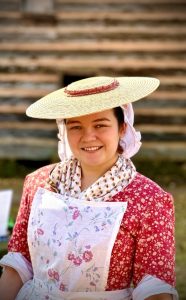Lander graduate makes history seem ‘sew’ appealing
July 5, 2024Last spring, Lander University student Erynn Bailee Price was at the Ninety Six National Historic Site discussing the foundation garments that women in America’s colonial era would have worn.
Several months later, Price was designing doll-size attire for an exhibit highlighting the American Revolutionary War at The Museum in Uptown Greenwood. The dolls depicted clothing worn by an upper-class woman, a woman working in her home, an enslaved woman and a Native American woman.
Earlier this year, she was preparing her senior thesis, an in-depth portrayal of advertisements for women’s clothing in the Gilded Age through the time before World War I. The future of women’s fashions was influenced by advances in technology and a growing trend in women’s participation in sports.
“I really enjoyed studying that time period because it came when our nation was not at war,” said Price, who is taking her expertise in culture and fashion to an advanced level when she enters the University of South Carolina’s prestigious doctoral program in history this fall.
“Before the Gilded Age, women were expected to remain indoors, to be soft and graceful and not tanned. Our culture made a turn, and advertisements for women’s clothing encouraged youth and vitality,” she said.
At USC, her focus will be on U.S. cultural history from 1780 – 1910, and her studies will highlight women’s clothing from that era and how historical events and culture shaped trends in women’s wear.
It was clear to anyone who saw Price rushing from one place to another on Lander’s campus that she has a keen fashion sense and smart attention to detail. From cute cloche hats to western boots with fringe and colorful, fun handbags, the smartly attired Price stood out in a crowd.
Price’s interest in fashion and sewing began when her grandmother taught her to sew at age five. She was eager to learn, first by making sock monkeys. Her skills developed quickly as she made clothes for her American Girl dolls and eventually made clothes for herself.
Growing up in Ninety Six, a town steeped in Revolutionary War history, it seemed natural that her interest in apparel and America’s pursuit for freedom would merge. She became interested in participating in historic re-enactments. While pursuing her bachelor’s degree in history, Lander professor Dr. Franklin Rausch encouraged her interests, and she became immersed in designing colonial-era clothing and giving historical presentations at Star Fort.
For the museum exhibit, she contributed two of her Revolutionary War-period dresses. Her garments, carefully researched for fabrics and styles of the era, were hand sewn with fine stitching. So meticulous is Price’s attention for accuracy, that she tore the pieces of fabric used for the Native American maiden’s doll dress – just as the women of a tribe would have done.
When Price became engaged to marry, she worked with a London-based jeweler who specializes in historic jewelry to design a ring, featuring garnets, which she could wear that would be authentic to Revolutionary War re-enactments. “I wanted my ring to be historically accurate,” she said, noting that the ring given by George Washington to his future bride, Martha Custis, featured garnets, too.
Her community service and wardrobing expertise were recognized when the Issaqueena Chapter, Daughters of the American Revolution presented her with a DAR Certificate of Appreciation and Medal for costume design and creation of clothing for the museum exhibit. She also advised chapter members on creating authentic colonial attire.
In April, Price earned the Dean’s Award from Lander’s College of Behavioral and Social Sciences. The award is given to students who embody a liberal arts education in their pursuit of learning in their courses and in all campus experiences and out-of-classroom engagement. She also received the college’s Barbara A. Jackson Award for the best senior thesis.
The College of Arts and Humanities presented Price, who earned Dean’s List honors throughout her education at Lander, with the XLR Award, honoring a student’s contributions to the student radio station. Price hosted a regular radio show highlighting female performers.
When she completes her doctoral program, Price wants to teach at a college or university that will support her research interests and provide her with the opportunity to write articles and books.
Although graduate school may have seemed daunting at first, Price said meeting other graduate students put her at ease. “I knew this is where I am supposed to be. We just clicked.”



















